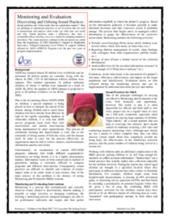Sound practices make a difference; they have a sustainable effect; and they serve as a model for adapting initiatives elsewhere. The sound practices outlined in this document are culled from the experiences of CRS Zimbabwe’s Support to Replicable, Innovative, Village/Community-Level Efforts to support children affected by AIDS (STRIVE) Program over the past two years of program implementation.
One of the principal challenges of carrying out effective Monitoring and Evaluation is the costs, both monetary and opportunity, involved. The reality is that it is often impossible for officers and field staff to visit every project site on a regular basis to carry out a full-scale evaluation, especially when projects are serving large amounts of children.
“Spot checks,” are a sound practice that can help to overcome this obstacle. Spot checks consist of randomly selecting a few sites and conducting surprise monitoring visits. Although spot checks are not a means to collect complete data, they can often uncover certain trends about how completely records are being kept, the effectiveness of the beneficiary selection process, and the actual number of children being served at a certain site.
Working with children adds an additional complication to the M&E process: getting children to sit still long enough for monitors to collect accurate information. “Station days” are a sound practice that actually makes data collection enjoyable for the children involved. During the station day, school aged children are brought to a specified location where they participate in different stations that either collect or distribute information. For example, children might rotate from height/weight measurements, to playing an HIV prevention game, to answering survey questions on PSS, and then finish by attending a presentation on personal hygiene where they are given a bar of soap. By combining M&E with participatory activities for the children, station days have proven to be an effective means of collecting data in a non-“extractive” and participatory manner, in both urban and rural areas.
©Catholic Relief Services and USAID

